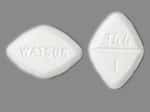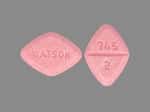ProSom® is in the class of drugs called triazolo benzodiazepine, a benzodiazepine derivative drug used for the short-term treatment of insomnia. It is habit-forming and not recommended for prolonged use due to adverse effects, misuse, and addiction.
ProSom® Overview
ProSom® is a central nervous system depressant that slows activity in your brain. The most common use for this medication is to help people who have difficulty falling and staying asleep.
What is ProSom®?
ProSom® (also known as estazolam, the generic name for ProSom®) is a medication used to treat insomnia. It is a benzodiazepine derivative, which works to depress your central nervous system and produces a sedative effect so you can fall asleep faster and stay asleep longer.
ProSom® is recommended only for short-term use due to its potential for abuse and addiction.
Is estazolam a Benzo?
ProSom® or estazolam is a benzodiazepine, which is an effective solution for insomnia. Benzos work by increasing the GABA receptors in your body to calm your central nervous system. This makes it easier to fall asleep and stay asleep.

Is ProSom® Safe to Take?
ProSom® is safe to take when prescribed by your doctor and taken for its intended purpose. However, taking ProSom® without a prescription or for longer than advised is not recommended. We suggest using a natural alternative when possible to avoid the risk of misuse or addiction.
ProSom® Uses
ProSom® is prescribed for the short-term treatment of insomnia. It helps you fall asleep faster, stay asleep longer, and reduce overnight wakefulness episodes. Estazolam® is a benzodiazepine, which means it is designed to produce a calming effect that helps people diagnosed with insomnia get the sleep they need.
ProSom® vs. Xanax®
Both ProSom® and Xanax® are benzos, which means they depress your central nervous system and produce a calming effect. Estazolam® is commonly used to treat insomnia, while Xanax® is used in the treatment of anxiety and panic attack disorders. Xanax® has also proven its efficacy with related conditions like agoraphobia.
ProSom® vs. Valium®
ProSom® and Valium® are both benzodiazepines, which means they work similarly to sedate and calm the person taking the medication. However, they treat different disorders. ProSom® is used to treat insomnia, whereas Valium® is frequently prescribed for the treatment of anxiety and seizure disorders as well as alcohol withdrawal.
ProSom® vs. Klonopin®
ProSom® and Klonopin® are in the class of drugs called benzos. They are both intermediate-acting agents that stay in your system for 11 to 20 hours. The key difference between these two medications is what disorders they treat. ProSom® is used to treat insomnia, and Klonopin® treats seizure disorders.
ProSom® vs. Dalmane®
ProSom® and Dalmane® are both used to treat insomnia and other sleep disorders. However, estazolam has been proven to reduce the risk of side effects when compared to Dalmane®.[1]
ProSom® vs. Ativan®
There are a few differences between ProSom® and Ativan®, despite the fact that they are both benzodiazepines. ProSom® helps you fall asleep and stay asleep longer, whereas Ativan® helps you to become more relaxed.
Estazolam is prescribed to treat insomnia, but Ativan® is primarily given in the treatment of anxiety and seizure disorders or in the case of alcohol withdrawal.
ProSom® Dosage Information
 |
 |
 |
| Prescribed for: Insomnia
.5 mg is typically only |
Prescribed for: Insomnia | Prescribed for: Insomnia |
ProSom® Side Effects
Due to its calming effects, ProSom® is a helpful medication for people who experience anxiety but, there are downsides. It’s important that you tell your doctor if you experience any of the side effects that have been reported when taking ProSom®, especially if they are severe or persistent:
- Dry mouth
- Dizziness
- Headache
- Weakness
- Palpitations
- Sleep-driving (sleep-cooking, sleep eating, etc.)
- Muscle pain or spasm
- Abnormal thinking
- Slowed motor function
- Hostility
Long-term use effects can include oversedation to the degree of negatively impacting cognitive function.[2]
If you have any of the symptoms below, call your doctor immediately and seek emergency medical treatment:
- Fever
- Blisters
- Rash or hives
- Difficulty breathing or swallowing
- Swelling of the eyes, face, lips, tongue, throat, arms, hands, feet, ankles, or lower legs
ProSom® Withdrawal Symptoms
ProSom® is a brand-name benzodiazepine with risk of abuse and addiction. It is a habit-forming Schedule IV substance, so you may experience withdrawal if you stop taking this medication suddenly.
This is especially true if you are currently taking frequent high doses. Talk with your doctor before ceasing Estazolam® so they can gradually decrease your dosage to avoid unwanted symptoms.
Common withdrawal symptoms for people taking this medication can include:
- Uncontrollable shaking
- Sweating
- Delusions
- Headaches
- Irritability
- Nightmares
- Convulsions
- Seizures
- Constipation or diarrhea
- Nausea/vomiting
- Muscle cramps
How to Detox From ProSom®
Detoxing from ProSom® should be done under the supervision of a physician at a medical detox facility. It is recommended that patients seek medical help due to potential life-threatening effects as a result of stopping this medication.
Benzo withdrawal symptoms range from uncomfortable to dangerous, which makes being under the supervision of professionals a necessary precaution for patient safety.
ProSom® Detox Timeline
ProSom® detoxes last about 19 days, with symptoms manifesting within the first 10-24 hours after ceasing the medication. Here is the timeline for detoxing from ProSom®.
24 hours after last dose
This period is known as early withdrawal. The symptoms you may experience during the first few days of detoxing from ProSom® include insomnia and anxiety.
3 days after last dose
Depending on your dependency level, among other factors, this acute withdrawal period can last between a few days up to two weeks. This is the stage where we advise that you be under the care of professionals or checked into a medical detox facility, as symptoms can be dangerous or life-threatening.
2 weeks after last dose
You may start feeling fewer symptoms around the 19-day mark. However, about 10% of people experiencing withdrawal will struggle with symptoms for months after their last dose. These symptoms occur because of functional changes within the central nervous system as a result of taking this benzodiazepine.
ProSom® Overdose Symptoms
While it is safe for you to take Estazolam®, it is possible to overdose on the medication. This is especially true if alcohol or other drugs are involved. As a Benzo, Estazolam® is a CNS depressant which directly inhibits respiratory function and can lead to dangerous overdose.[3]
Common symptoms of a ProSom® overdose include:
- Vomiting
- Pain
- Loss of coordination
- Loss of consciousness
- Trouble breathing
If you or someone you know is showing signs of an overdose, call your doctor right away and get to the nearest emergency room.

Is ProSom® Addictive?
ProSom® is a benzodiazepine and has the potential for abuse and addiction because it changes the chemical structure of your brain and is habit-forming. Even if you take Estazolam® as prescribed, it is possible to become addicted.
ProSom® Addiction Treatment & Rehab Options
While it can be uncomfortable to admit you are addicted to a medication you were prescribed, there is hope in healing. It’s important to reach out for help if you notice signs of addiction or abuse because there are treatment options available to you.
ProSom® rehab is designed to effectively manage your withdrawal symptoms as you wean off of the medication. Symptoms range from uncomfortable to dangerous, which is why we recommend that treatment for a ProSom® addiction be done under the care of professionals at a medical facility.
When going through a medically assisted detox, the goal is your comfort and safety.
ProSom® Frequently Asked Questions
Your doctor will always be the best source for questions you have about ProSom®, but here are answers to the most common questions.
You can get a prescription for Estazolam® from your general practitioner if they agree it is the best medication to treat your disorder.
ProSom® is intended for short-term use, which means taking it for an extended period of time can lead to dependence on the drug.
It is also possible to overdose on estazolam if you take a higher dose than you’ve been prescribed. Symptoms of a ProSom® overdose include vomiting, pain, loss of coordination, loss of consciousness, and trouble breathing.
Estazolam® is the generic name for ProSom®. They are the same medication.
Yes, Estazolam® can be abused if taken for longer than directed or by taking a higher dose than recommended.
Signs of estazolam addiction include a mental or physical dependence on the medication. Common signs of an addiction include lying about drug use, loss of coordination, isolation, a disruption in sleep patterns, and hypersensitivity.
Estazolam® is safe to take short-term under the supervision of your doctor. However, Estazolam® may increase the risk of life-threatening breathing problems, sedation, or coma. If the medication is combined with alcohol or opioids, the risk of death is present.
Recover From ProSom® Addiction
There is dignity in healing when you come to Gallus. You get a personalized treatment plan and round-the-clock supervision from our highly trained staff to aid your recovery. Detoxing from ProSom® can be comfortable and safe if you choose our medical detox facility. Contact us today to start feeling better tomorrow.
